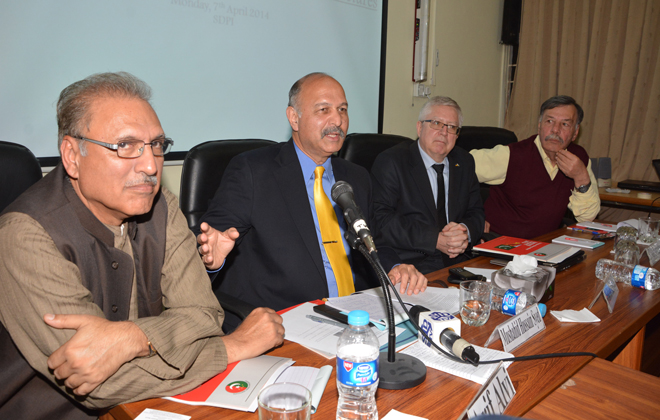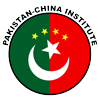PCI discusses 'Changing Dynamics in Global Power Structures'
Source : PCI Date : 24-05-2014 By : Our Staff
 |
|
|
Pakistan-China Institute (PCI) organized a policy seminar on “Changing Dynamics in Global Power Structures” that brought together representation from the parliament, diplomatic community, academics and various opinion makers to discuss the issue in the light of the crisis in Ukraine. The speaker’s panel included Senator Mushahid Hussain Sayed (Chairman, Pakistan China Institute and Senate Defence Committee), Dr.ArifAlvi (Chairman NA Foreign Affairs Committee), andVolodymyrLakomov (Ukrainian Ambassador to Pakistan).
Senator Mushahid Hussain Sayed, in the keynote address, stated that Pakistan’s stance on Ukraine is based on principles, irrespective of the emerging great game between the US and Russia. “We consider the annexation of Crimea by Russia through the use of force as a blatant violation of UN Charters, international law and norms.” He explained that the international system is based on international laws which must be held supreme by all to ensure a measure of security and stability in the world and thus territorial violation of any country in the 21st Century is unacceptable. The Senator also argued that Pakistan can fully sympathize with Ukraine since it also suffered similarly in 1971 when one part of it was dismembered by intervention of external forces. “The fact that Russia got away with a violation of the clear terms of the Budapest Memorandum with no noteworthy international sanctions is important,” pointing out that Russia provides gas to Europe and thus, pragmatism has triumphed over principles'.With reference to the Tatar community, Senator Mushahid said that protecting the interests of different groups in Crimea is essential as they have suddenly become foreigners in their own country. The Tatars, he said, have had a very tragic history under the rule of Stalin who persecuted them by driving them out of their homeland.
Dr.ArifAlvi deliberated on the dynamics of power and international system which- he opined- has a very arbitrary basis that has seen shifts from steel to oil to nuclear capability, and stated that Vietnam should have taught a lesson to not intervene in other countries. He explained that in the coming era the source of power would be beyond geography given the following trends in world politics: resurgence of Russia, rise of China, expected constitutional revision by Japan, US self-sufficiency in oil and revision of US Middle East policy, among others. He deemed one of the greatest crises to be the sectarian division that is rapidly becoming growing in the Muslim world which is marked by unexpected congruence between Israel and Saudi Arabia on the issue of Iran, and shifting stance of Pakistan on the Syrian crisis. On the issue of Ukraine, he said that international pressure should be exerted to bring Russia to heels and to establish a norm of non-intervention in the internal matters of other countries.
Ambassador Lakomov stated that integral part of Ukraine has been annexed by Russia, a country that had pledged to uphold Ukraine’s territorial integrity in the Budapest Treaty. He argued that UN resolutions show how isolated Russia is in its violation of the most fundamental international laws. He further explained that this illegal annexation will be detrimental to a culture of nuclear security which is endeavouring to establish rule of law on disarmament and proliferation. Commenting on the crisis, he said that the uprising in Ukraine was solely based on an anti-corruption campaign against Yunokovich which resulted in a change in the status quo. On the Crimean crisis, the Ambassador observed that anillegal referendum- with falsified voting just like in times of Stalin- was held to justify a blatant violation of law. He explained that Ukraine showed utmost restraint in Crimea to prevent bloodshed and his country is still open to dialogue but only if its territorial integrity is respected and there is no use of force. “Our choice to live independently is not directed against Russia”, he underscored.
The addresses by the panellist were followed by remarks and questions from the participants who produced a lively discussion on the topic. There was a consensus on unacceptability of interference by force or otherwise in any country by another country. The participants also underscored the importance of having policy seminars on issues of national and international significance and appreciated the PCI and SDPI.
